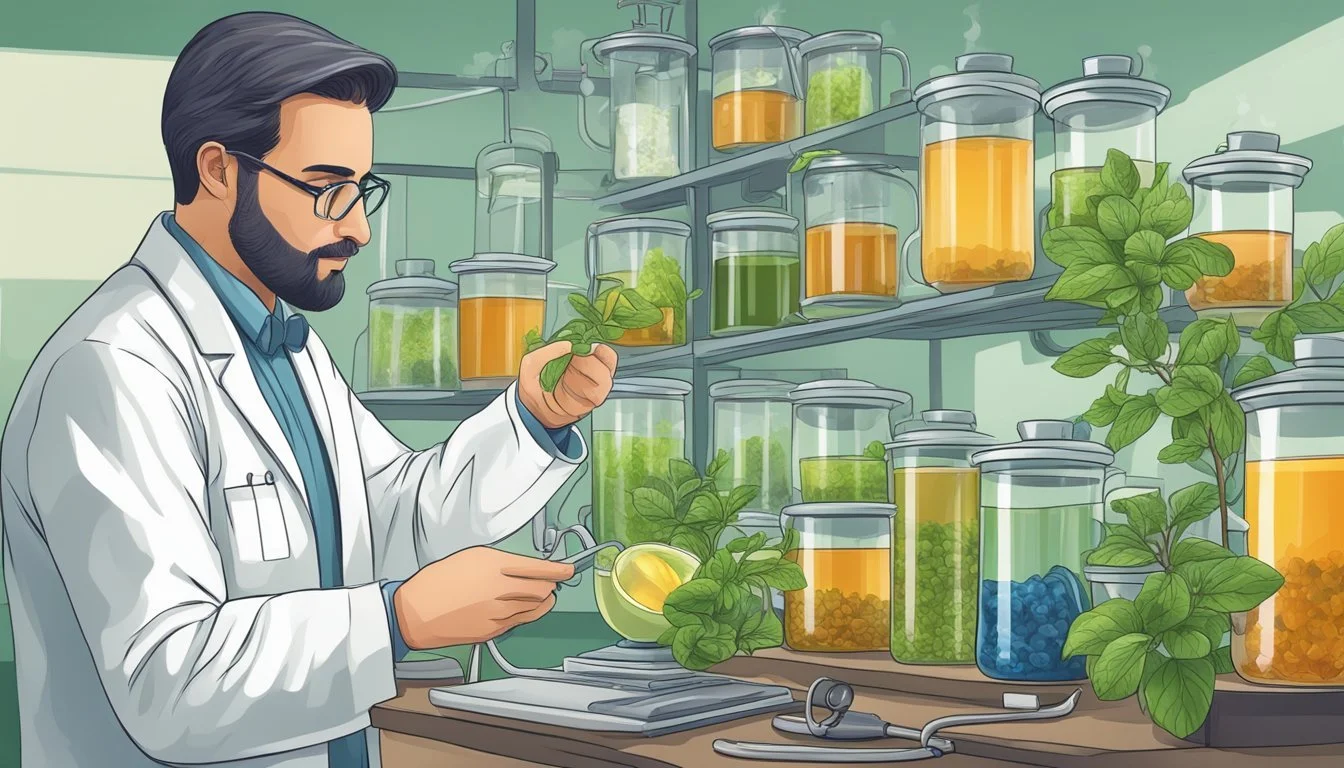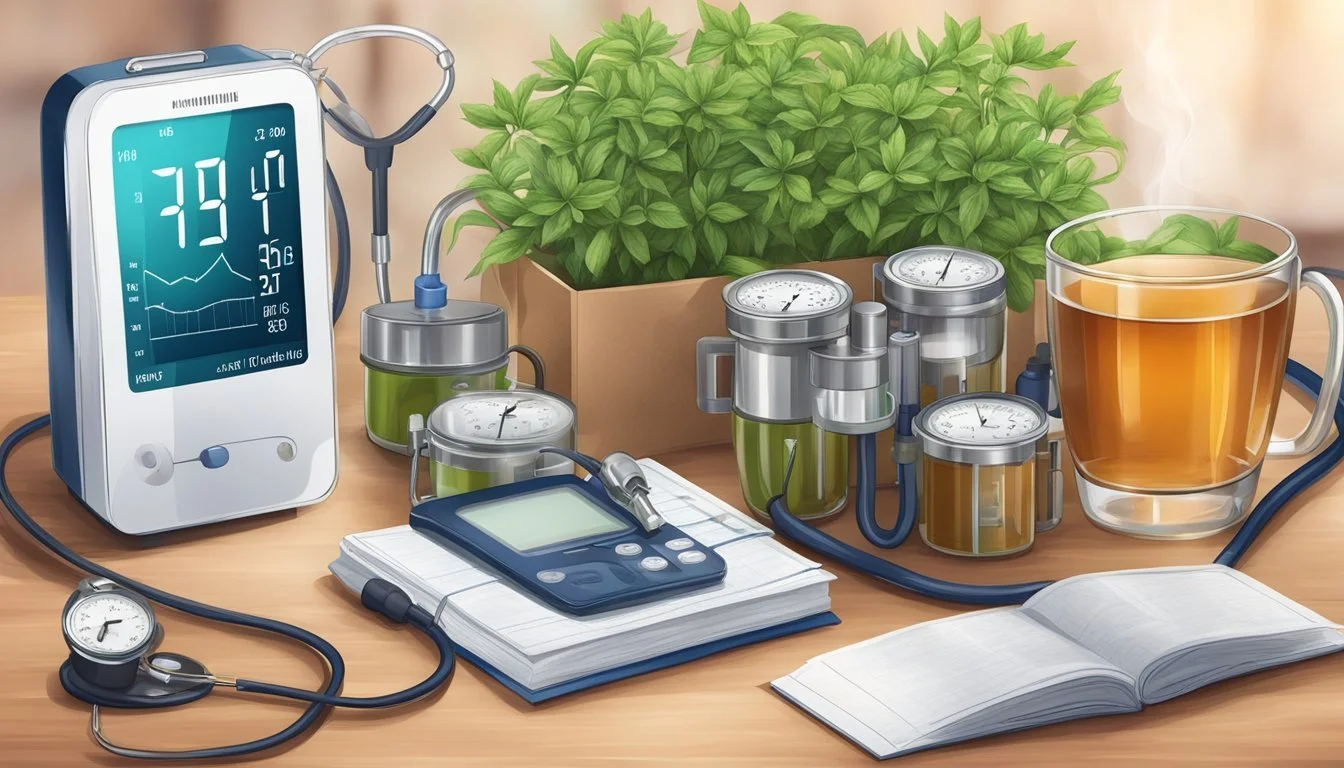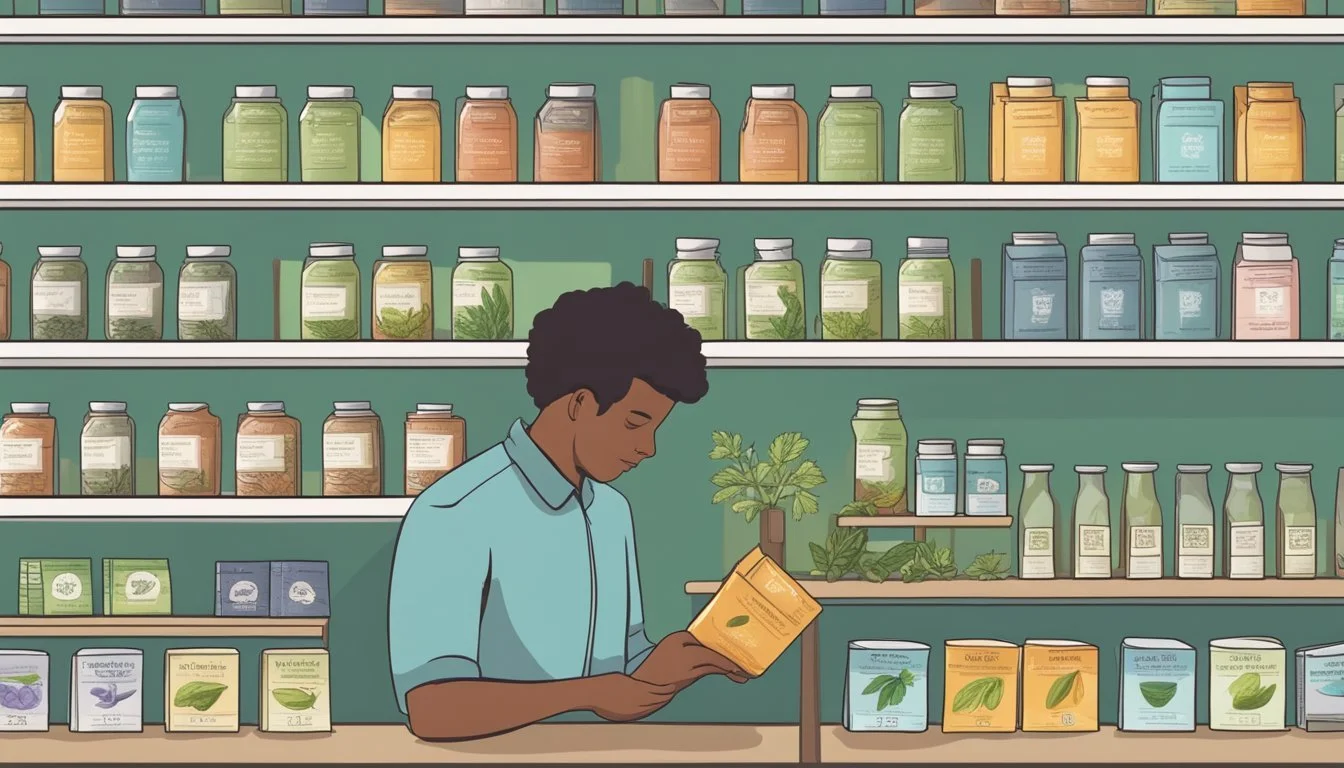Is It Safe to Use Herbal Teas for Managing Hypertension?
Understanding Risks and Benefits
Managing hypertension, commonly known as high blood pressure, is often approached with a combination of medication and lifestyle changes. Among these changes, the consumption of herbal teas has gained popularity as a complementary practice. The idea is that certain herbal teas can aid in lowering high blood pressure, thanks to their bioactive compounds. While conventional antihypertensive medications are designed to target specific pathways to control blood pressure, herbal teas are believed to work differently, providing a natural alternative to support cardiovascular health.
Although the use of herbal teas as a remedy for various ailments is an ancient practice, it is imperative to consider their safety and effectiveness for managing hypertension. Some herbal teas have been scientifically tested and have shown potential benefits in controlling high blood pressure. Components such as oleuropein in olive leaf tea and allicin in garlic are thought to relax blood vessels and improve circulation. However, these findings don’t replace professional medical advice, and individuals with hypertension should exercise caution. When considering herbal teas as a complementary treatment, it is crucial to understand that not all teas are created equal, and their interactions with prescription medication need to be considered to avoid any adverse effects.
It is also worth noting that the pursuit of using herbal teas for hypertension aligns with broader recommendations for lifestyle modifications to prevent heart disease. These modifications include a healthy diet, regular physical activity, and stress reduction. The integration of herbal teas within this holistic framework can be seen as part of a multi-faceted approach to heart health. It is essential to consult healthcare professionals who can provide guidance on the safe use of herbal remedies in tandem with traditional medical treatments.
Understanding Hypertension
When discussing hypertension, it is essential to understand the fundamentals of blood pressure and the various factors that contribute to the development of this condition.
Blood Pressure Basics
Blood pressure is the force exerted by circulating blood on the walls of blood vessels. It is crucial for maintaining life, allowing for the distribution of blood throughout the body, delivering oxygen and nutrients to tissues. Two numbers represent blood pressure readings:
Systolic blood pressure (SBP): the pressure in the arteries when the heart beats and fills them with blood.
Diastolic blood pressure (DBP): the pressure in the arteries when the heart rests between beats.
A blood pressure reading has two components, articulated as systolic over diastolic. For example, a normal reading is typically under 120 mmHg for systolic and 80 mmHg for diastolic, expressed as 120/80 mmHg.
Chronically elevated blood pressure, known as hypertension, increases the risk for heart disease and stroke – two leading causes of death.
Risk Factors for Hypertension
Risk factors for hypertension range from genetic predispositions to lifestyle choices and environmental exposures. These factors may influence both systolic and diastolic blood pressure. Consider the following list of contributors:
Genetics: A family history of hypertension can increase a person's risk.
Age: The risk of developing hypertension increases as a person ages.
Weight: Overweight and obesity are significant risk factors.
Sedentary Lifestyle: Lack of physical activity can contribute to high blood pressure and related complications.
Diet: Diets high in salt, processed foods, and low in fruits and vegetables are risk factors.
Alcohol and Tobacco Use: These substances can increase blood pressure.
Chronic Conditions: Diseases such as diabetes and kidney disease can affect blood pressure.
Stress: Chronic stress can contribute to temporary and long-term increases in blood pressure.
Managing these factors is critical in preventing and treating hypertension, thereby reducing the likelihood of associated health complications.
Herbal Teas and Hypertension
Many individuals with hypertension consider herbal teas as a natural remedy to manage their condition. These teas contain active substances that may influence blood pressure, offering an alternative or a complement to traditional medications.
Active Ingredients in Herbal Teas
Herbal teas, distinct from teas made from the Camellia sinensis plant (like black, green, white, and oolong tea), often include a mixture of herbs, spices, and other plants. Notably, hibiscus tea is rich in polyphenols, which are natural compounds known for their antioxidant properties. Antioxidants help to mitigate oxidative stress, a factor in hypertension. Another common ingredient found in olive leaf tea is oleuropein, which has been demonstrated to have blood pressure-lowering effects.
The specific ingredients in herbal teas are responsible for their different proposed health benefits. For instance:
Hibiscus petals contain flavonoids and other polyphenols, linked to lowered systolic and diastolic blood pressure.
Garlic, although not commonly found in teas, transfers some of its sulfur-containing properties, like allicin, to garlic-based concoctions, and is known to promote healthy circulation and vascular relaxation.
Herbal Teas vs. Traditional Medications
When comparing herbal teas to traditional hypertension medications, it's crucial to recognize that while certain herbs can affect blood pressure, they typically do so less aggressively than pharmaceuticals. Medications are specifically dosed and have targeted mechanisms of action for controlling high blood pressure, and their efficacy and safety are supported by extensive clinical trials.
Herbal teas may serve as a supplementary approach. They are less likely to induce rapid changes in blood pressure than medications and might be more suitable for mild cases or for general cardiovascular health. For instance:
Green tea and black tea, both derived from the Camellia sinensis plant, contain polyphenols like catechins, which have been associated with modest blood pressure reduction.
However, it is critical for patients to consult healthcare professionals before starting any herbal regimen, as interactions with prescribed medications can occur, and the safety profile of these herbal remedies is not as well-established.
Scientific Research on Herbal Teas
Scientific studies on herbal teas provide insights into their potential effects on managing hypertension. Research often focuses on identifying active compounds and observing their impact on systolic and diastolic blood pressure.
Meta-Analysis Findings
A meta-analysis offers a comprehensive approach to evaluate the efficacy of herbal teas in hypertension management. It aggregates data from multiple studies, enhancing the reliability of findings. Recent meta-analyses have pointed to certain herbal teas containing flavonoids that may contribute to modest reductions in blood pressure. Hibiscus sabdariffa, commonly known as hibiscus tea, has been frequently analyzed due to its high concentrations of flavonoids and anthocyanins.
Impact on Blood Pressure
Investigations into the specific impact of herbal teas on blood pressure have revealed varied results:
Systolic Blood Pressure (SBP): Studies indicate that regular consumption of hibiscus tea can lead to a significant decrease in SBP, possibly due to the vasodilating effects of its flavonoids.
Diastolic Blood Pressure (DBP): The impact on DBP appears to be less consistent, with some studies showing moderate decreases, while others report negligible changes.
Other tea components, such as catechins and particularly epigallocatechin gallate (EGCG) found in green tea, have been associated with blood pressure regulation mechanisms. Their antioxidant properties may aid in improving endothelial function and thereby lowering blood pressure.
Lifestyle Considerations
Managing hypertension often requires a multifaceted approach that includes lifestyle changes. This section discusses the impact of diet and nutrition as well as the importance of physical activity and stress reduction in controlling high blood pressure.
Diet and Nutrition
A person's diet plays a crucial role in managing hypertension. It is generally advised that they include a variety of fruits and vegetables in their meals, as these foods are rich in essential vitamins, minerals, and fiber that can help in maintaining healthy blood pressure levels. Dietary supplements, such as garlic extract and olive leaf extract, have been studied and shown to produce positive effects on blood pressure, but they should be used in conjunction with a balanced diet, not as a replacement.
Fruits and Vegetables: Aim for 5 servings per day.
Garlic and Olive Leaf Extract: Can be beneficial but should be used responsibly after consulting a healthcare provider.
Physical Activity and Stress Reduction
Regular exercise can help lower blood pressure by strengthening the heart, allowing it to pump more efficiently with less effort. It is recommended that individuals engage in at least 150 minutes of moderate-intensity activity each week. Alongside physical activity, effective stress reduction techniques, such as meditation, deep breathing exercises, or yoga, may help reduce blood pressure. Adequate sleep is also vital, as poor sleep quality can affect blood pressure negatively.
Exercise: 150 minutes per week of activities like walking, cycling, or swimming.
Stress Reduction: Meditation, deep-breathing exercises, and yoga are beneficial practices.
Sleep: Aim for 7-9 hours of quality sleep per night.
Potential Health Benefits
Herbal teas may offer a spectrum of health benefits, particularly in the context of hypertension management. They often contain natural compounds that can support cardiovascular health and provide anti-inflammatory effects, making them an attractive addition to a heart-healthy lifestyle.
Cardiovascular Health
Herbal teas may contribute to cardiovascular health by affecting blood pressure and cholesterol levels. Certain teas contain flavonoids, which are antioxidants that can help relax blood vessels, thus reducing blood pressure. This vascular relaxation is partly attributed to the enhancement of nitric oxide production, a critical factor in promoting blood flow and reducing arterial pressure. Consuming teas with these properties may assist in the natural management of hypertension.
Green tea: Regular intake has been associated with a moderate reduction in systolic and diastolic blood pressure.
Olive leaf tea: Contains compounds that can influence both blood pressure and cholesterol, key components of heart health.
Anti-Inflammatory Effects
The anti-inflammatory properties of herbal teas are partly due to their antioxidant content. Inflammation is closely linked with chronic diseases, including hypertension, making the anti-inflammatory effects of certain teas beneficial.
Oolong tea: May support healthy blood pressure levels and also contains antioxidants that can help reduce inflammation within the cardiovascular system.
White tea: Often less processed, retaining a high level of antioxidants, which may contribute to reducing inflammation and supporting heart health.
Herbal teas can act as natural remedies that provide supportive health benefits, especially when incorporated into a balanced diet and lifestyle for those managing hypertension. However, caution is advised, as some teas may interact with medications or not be suitable for everyone. Consulting healthcare providers is recommended to determine the best approach.
Safety and Side Effects
When considering herbal teas for hypertension management, it is crucial to approach usage with caution, taking into account proper dosages and potential interactions with other medications. Consulting a healthcare provider before starting any herbal treatment can provide guidance tailored to individual health needs.
Recommended Dosages
Proper dosing of herbal teas can vary greatly depending on the type of herb and the individual's health status. For example, olive leaf extract is sometimes recommended in studies, with some individuals consuming approximately 20 mL daily to see benefits in blood pressure management. However, it is essential to note that most dosages provided in studies are specific to that study and may not be universally applicable. Individuals consuming such herbal teas should follow dosing instructions provided by a qualified healthcare provider or the specific guidelines outlined on the product's packaging, if available.
Known Interactions with Medications
Herbal teas can interact with prescribed medications, including those for hypertension and heart conditions. For instance:
Caffeine in some herbal teas may increase blood pressure and could potentially reduce the effectiveness of blood pressure medications.
Certain herbs may have additive effects with blood pressure drugs, leading to unintended lower blood pressures.
Other substances like alcohol should be used cautiously as alcohol can also interfere with blood pressure control and the efficacy of hypertension medications.
It is recommended to discuss any herbal tea consumption with a healthcare provider to ensure there are no adverse interactions with existing medications. Individuals should always inform their healthcare provider about all the herbal remedies, supplements, and over-the-counter medications they are taking to safely manage their treatment.
Choosing the Right Herbal Tea
When managing hypertension, selecting an appropriate herbal tea involves understanding the distinct properties of various herbs and the proper brewing methods to maximize their potential benefits.
Varieties and Their Properties
Hibiscus Tea: Derived from Hibiscus sabdariffa L., this tea is known for its potential to lower blood pressure. Studies have indicated that hibiscus tea may help reduce systolic and diastolic blood pressure.
Ginger Tea: Ginger, containing the active compound gingerol, is recognized in traditional Chinese medicine for its anti-inflammatory properties and may aid in cardiovascular health.
Basil: Not traditionally consumed as a tea, basil may still be beneficial when steeped in hot water. It is suggested to have a calming effect on the body and mind, though direct effects on blood pressure are not well established.
Green Tea: Rich in antioxidants, green tea can support overall heart health. While it contains caffeine, which can affect blood pressure, moderate consumption might be suitable for some individuals.
Chamomile Tea: Often consumed for its relaxing effects, chamomile tea is typically used as a sleep aid, and adequate sleep is crucial for maintaining normal blood pressure levels.
How to Brew for Maximum Benefit
To extract the health benefits of herbal teas, especially for managing hypertension, the following brewing guidelines should be considered:
Temperature: Brew teas at 80-85°C for green tea and near-boiling for most herbal teas to ensure the release of beneficial compounds without destroying them.
Steeping Time: Generally, steep for 5-10 minutes. Hibiscus tea, for example, should steep for at least 5 minutes to allow the full range of flavors and beneficial compounds to infuse the water.
Frequency and Quantity: Moderate, consistent consumption is key. Drinking 2-3 cups daily is a common recommendation, but this may vary based on the individual and the specific herb.
When choosing a herbal tea for hypertension, it's important to evaluate individual health, existing conditions, and potential drug interactions. Consulting with a healthcare provider is recommended to determine the most suitable choices and to understand the right balance between traditional treatments and herbal supplementation.
Conclusions
Herbal teas have been traditionally consumed as part of complementary and alternative medicine practices. Research indicates that certain herbs may offer benefits for heart health by contributing to the maintenance of healthy blood pressure levels. Herbal teas such as green tea, hibiscus, and chamomile are associated with antihypertensive properties.
It is essential to acknowledge that while herbs can help in managing blood pressure, their effects vary among individuals. A person considering herbal teas as part of their strategy to manage hypertension should consult a healthcare professional. This is crucial due to the potential for herb-drug interactions, especially if the individual is on prescribed medication for hypertension or other comorbid conditions.
The evidence suggests that incorporating herbal teas into one's diet could support heart health, but these teas should not be viewed as a standalone treatment for managing high blood pressure. Instead, they should be considered as part of a holistic approach that includes a balanced diet, regular exercise, and medical oversight.
Here are key takeaways:
Herbal Teas: Potential adjunct therapy for hypertension.
Consultation: Necessary before starting any herbal regimen.
Holistic Approach: Herbal teas as part of a comprehensive health plan.
Research and Evidence: Supports some benefits, but further studies are needed.
Individuals interested in using herbal remedies should prioritize evidence-based information and adhere to guidelines provided by health authorities to ensure safety and efficacy.









